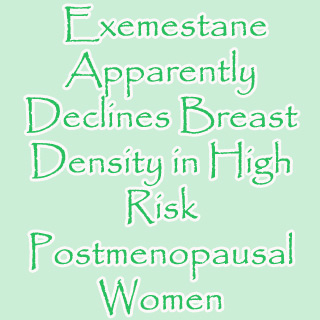
During the study, experts assessed the effect of exemestane (Aromasin) on breast density. Exemestane seems to decrease the amount of estrogen produced by the body. When estrogen level is reduced, it may slow or stop the growth of some breast tumors. The investigation enrolled 23 participants whose mammograms were taken before beginning exemestane and one year after treatment began. Investigators then compared breast density between the two mammograms for each woman.
Overall, Jennifer Eng-Wong, M.D., M.P.H., assistant professor of oncology at Georgetown Lombardi, a part of Georgetown University Medical Center and colleagues witnessed a seven percent decline in mammographic density among the women. Prior investigations have asserted that AIs among high risk women do not result in a considerable reduction of mammographic density. It was mentioned that the study will continue until an investigation can be carried out on mammographic density two years after treatment.
The study was presented at the 33rd Annual CTRC-AACR San Antonio Breast Cancer Symposium in Texas.
